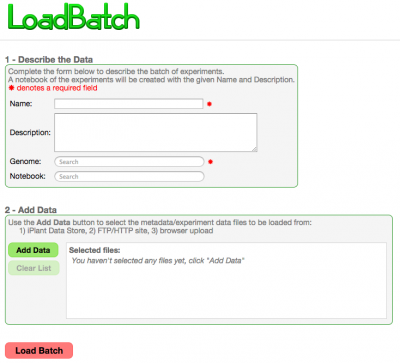LoadBatch: Difference between revisions
No edit summary |
No edit summary |
||
| Line 11: | Line 11: | ||
=== Metadata File === | === Metadata File === | ||
See the metadata section: [[Metadata]] | A single metadata file that describes the data files contained is required for the load. See the metadata section: [[Metadata]] | ||
=== Data File(s)=== | === Data File(s)=== | ||
Data files can be given individually or together as a compressed tar archive file, | Data files can be given individually or together as a compressed tar archive file (ending in .tar.gz, also known as a "tarball"). | ||
Valid combinations of input files include: | |||
* tarball of metadata file and data file(s) | |||
* metadata file and tarball of data file(s) | |||
* separate metadata file and data files | |||
You can select and retrieve data files located at: | You can select and retrieve data files located at: | ||
Revision as of 18:05, 22 September 2014
UNDER CONSTRUCTION
LoadBatch provides the ability to conveinently load a set of genomes or experiments in a single operation. To load a set of genomes or experiments using LoadGenome and LoadExperiment would require running the tool for each genome/experiment individually and could be very time consuming.

Inputs
Metadata File
A single metadata file that describes the data files contained is required for the load. See the metadata section: Metadata
Data File(s)
Data files can be given individually or together as a compressed tar archive file (ending in .tar.gz, also known as a "tarball").
Valid combinations of input files include:
- tarball of metadata file and data file(s)
- metadata file and tarball of data file(s)
- separate metadata file and data files
You can select and retrieve data files located at:
- The iPlant Data Store
- An FTP server
- Your computer (Upload)
Data Formats
For supported genome data file formats, see LoadGenome.
For supported experiment data file formats, see LoadExperiment.